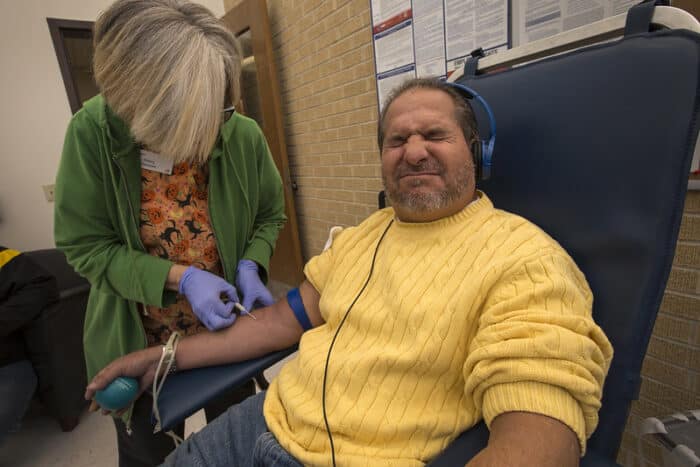If you’re an aspiring phlebotomist or are someone who is just interested in pursuing phlebotomy as a career, you might be wondering if this career is worth it-
Or more importantly, is phlebotomy as a career hard?
All careers have their difficulties, and the same is true for phlebotomy since it’s a career involving drawing blood that needs optimum care.
In this article, we will uncover what you can expect from phlebotomy as a career, and how you can become a successful phlebotomist.
What is Phlebotomy?
Let’s start with the most basic question you might be curious about: what exactly is phlebotomy?
Phlebotomy is the process where healthcare workers collect blood from patients. This is really important for figuring out what’s wrong with a person and how to treat them.
People who do this job are called phlebotomists, and they’re super important in healthcare because they make sure blood is collected accurately and without causing too much pain. This helps with proper testing and taking care of patients.
So, is phlebotomy hard?
Well, the answer is that it can be a bit challenging, like any other job. But if you approach it with the right attitude and skills, it’s definitely doable.

Do You Want To Become a Phlebotomist? Check Out Free Phlebotomist Masterclass!
In our masterclass you learn:
- How to be a Phlebotomist faster…in just 2 months!
- Avoid student debt & driving to classes
- #1 thing employers want from Phlebotomists
- How to stand-apart & get a university certificate for a strong resume
Phlebotomy Training Programs
To become a phlebotomist, one of the first things you need to do is sign up for a phlebotomy training program.
These programs are available all over the country and usually last a few weeks to a few months.
During your training, you’ll learn about:
1. Anatomy and Physiology: This means understanding how the body’s circulatory system, like veins and arteries, works. It’s important because you need to know where to draw blood from.
2. Techniques and Procedures: You’ll learn different ways to collect blood, like venipuncture (taking blood from a vein) and capillary puncture (pricking the skin). This is a big part of your training.
3. Infection Control: Staying safe from infections is a big deal. You’ll learn how to follow strict rules to protect yourself and your patients.
4. Soft Skills: These are the skills you need to talk to patients and make them feel comfortable. It’s important, especially for those who might be nervous about getting their blood drawn.
Challenges in Phlebotomy Career
As mentioned before, every career has some challenges that professionals face in their profession, let’s look at some of them:
- Worries about Needles: If you get scared of needles, it can be tough. However, lots of students can get better at handling this fear with practice and assistance.
- Working with Patients: Phlebotomists usually help people who are nervous or hurting. It’s important to communicate well and be patient to make their experience as smooth as possible.
- Getting it Right: It’s really important to take blood correctly and safely. This ensures that the samples are trustworthy for medical tests.
Success Tips
If you’re still here, you might be curious about how to become a successful phlebotomist.
We’ve got you covered with that today.
Let’s take a look at some of them:
1. Practice a Lot: The more you practice, the more confident you’ll get. You can practice on mannequins, other students, or people who volunteer.
2. Get Advice: Don’t hesitate to ask your teachers for feedback and tips. Learning from people who have done this job for a while can be really useful.
3. Stay Informed: Keep up with the latest phlebotomy techniques and tools. The healthcare field is always changing.
4. Be Kind: Show compassion and understanding to the patients. It will make the experience less stressful for both you and them.
Read: Phlebotomist Salary
Conclusion
So, is phlebotomy difficult? Well, it can be a bit challenging, but if you’re committed and eager to learn, you can make it.
Phlebotomy is an important job in healthcare, and there are many job opportunities for skilled phlebotomists in the United States.
Related Resources:
- Phlebotomist Skills
- Ultimate Phlebotomist Resume Guide – Phlebotomy Job
- Phlebotomist Duties
- Which Two Skills are Important for a Phlebotomist?
- Pros and Cons of Being a Phlebotomist
- How To Get a Phlebotomy Certification
- What are the Different Types of Phlebotomy Certifications?
- Phlebotomist Nurse
- Phlebotomist Lab Technician
- Phlebotomist Training
- Phlebotomy Classes
- NHA Phlebotomy
- Order of Draw Phlebotomy
- Phlebotomy Certificate
Related Articles
-
How to Be Successful in College in 2022 – 7 Simple Tips to Succeed
-
How Do Scholarships Work? Read This First…Truth is Shocking
-
7 Best College Majors 2024: What Should I Major In?
-
How to Choose a College – 10 Things You Must Consider in 2024
-
Why Go to College? Top 13 Benefits for Adult Students in 2022
-
Top 5 Best Alternatives to Community College for 2024








